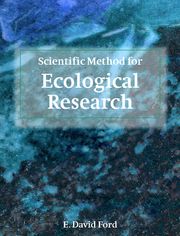Book contents
- Frontmatter
- Contents
- Preface
- Acknowledgements
- 1 Component processes of ecological research
- Introduction to Section I: Developing an analytical framework
- Introduction to Section II: Making a synthesis for scientific inference
- 10 Properties and domains of ecological concepts
- 11 Strategies of scientific research in ecology
- 12 Use of mathematical models for constructing explanations in ecology
- Introduction to Section III: Working in the research community
- Introduction to Section IV: Defining a methodology for ecological research
- Appendix: Suggestions for instructors
- References
- Glossary
- Author index
- Subject index
11 - Strategies of scientific research in ecology
Published online by Cambridge University Press: 08 January 2010
- Frontmatter
- Contents
- Preface
- Acknowledgements
- 1 Component processes of ecological research
- Introduction to Section I: Developing an analytical framework
- Introduction to Section II: Making a synthesis for scientific inference
- 10 Properties and domains of ecological concepts
- 11 Strategies of scientific research in ecology
- 12 Use of mathematical models for constructing explanations in ecology
- Introduction to Section III: Working in the research community
- Introduction to Section IV: Defining a methodology for ecological research
- Appendix: Suggestions for instructors
- References
- Glossary
- Author index
- Subject index
Summary
Summary
Philosophers of science have investigated the progress of scientific research, how new discoveries are made, and have described the methods that scientists use. Philosophers' theories reXect different viewpoints about the relative importance of social processes and discussion and argument among scientists. The stage of development of a scientific field may also affect how progress takes place. Three theories are described and applied to examples of ecological research.
Kuhn (1970) suggests that scientific advance occurs through recurring revolutionary periods, when there are major changes in objectives and methods, separated by periods of normal research. Normal research follows a paradigm – when a distinct social group uses agreed methods and procedures to tackle agreed questions of importance. When the revolution comes, objectives, methods, and people involved in the research all change. The development of ecosystem research is analyzed with this theory.
Lakatos (1970) characterizes scientific research as a debate between data and rival theories, with theoretical advance continuous rather than revolutionary. Falsification is not a simple process but occurs through continuous debate and analysis. Scientists maintain a positive heuristic, a long-term research policy that anticipates possible refutations and develops a hard core of knowledge irrefutable by the methods of the research program. This is applied to the development of top-down and bottom-up theories about balance between plants, herbivory, and predation.
Initiation of a new field of research, or effecting a junction between existing fields, requires the investigation of domains (Shapere 1977). A domain includes related observations, an important problem about those observations, and the readiness of science to deal with both observations and problem.
- Type
- Chapter
- Information
- Scientific Method for Ecological Research , pp. 309 - 350Publisher: Cambridge University PressPrint publication year: 2000



